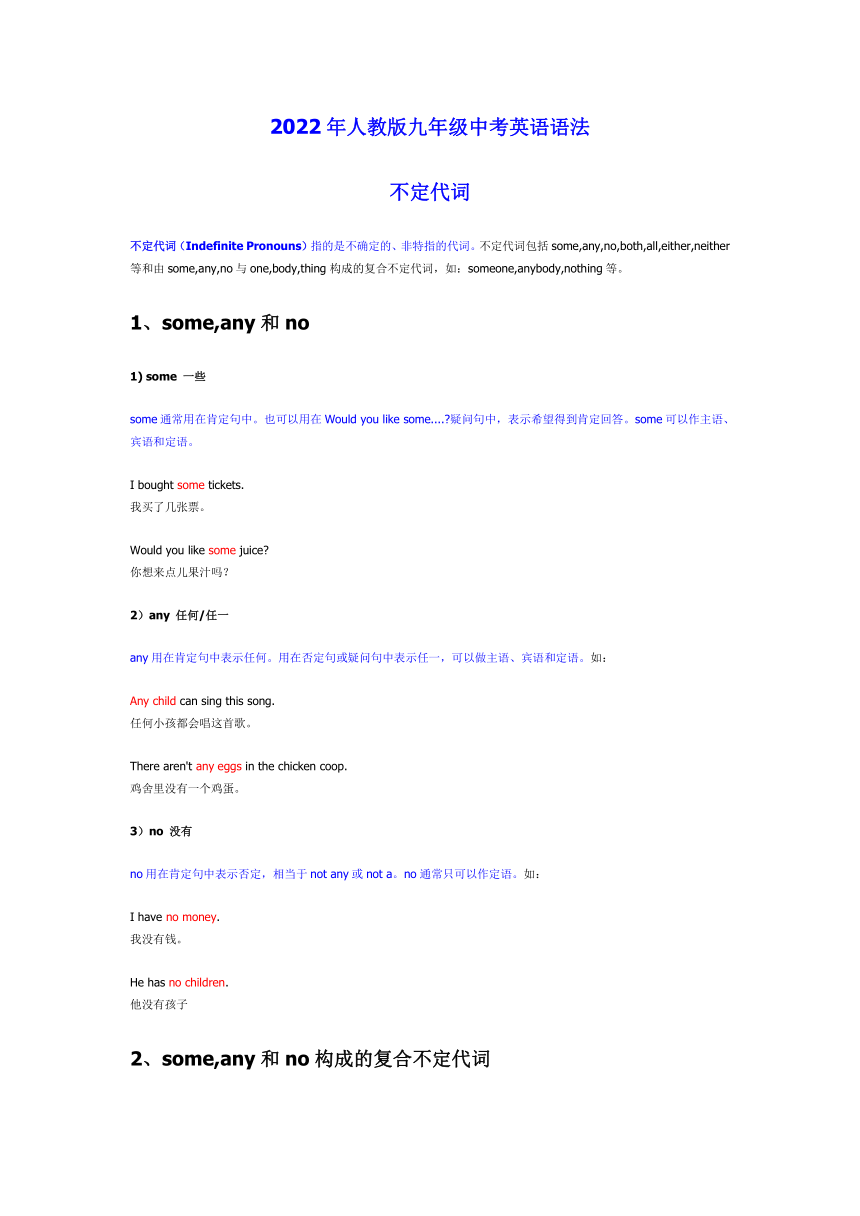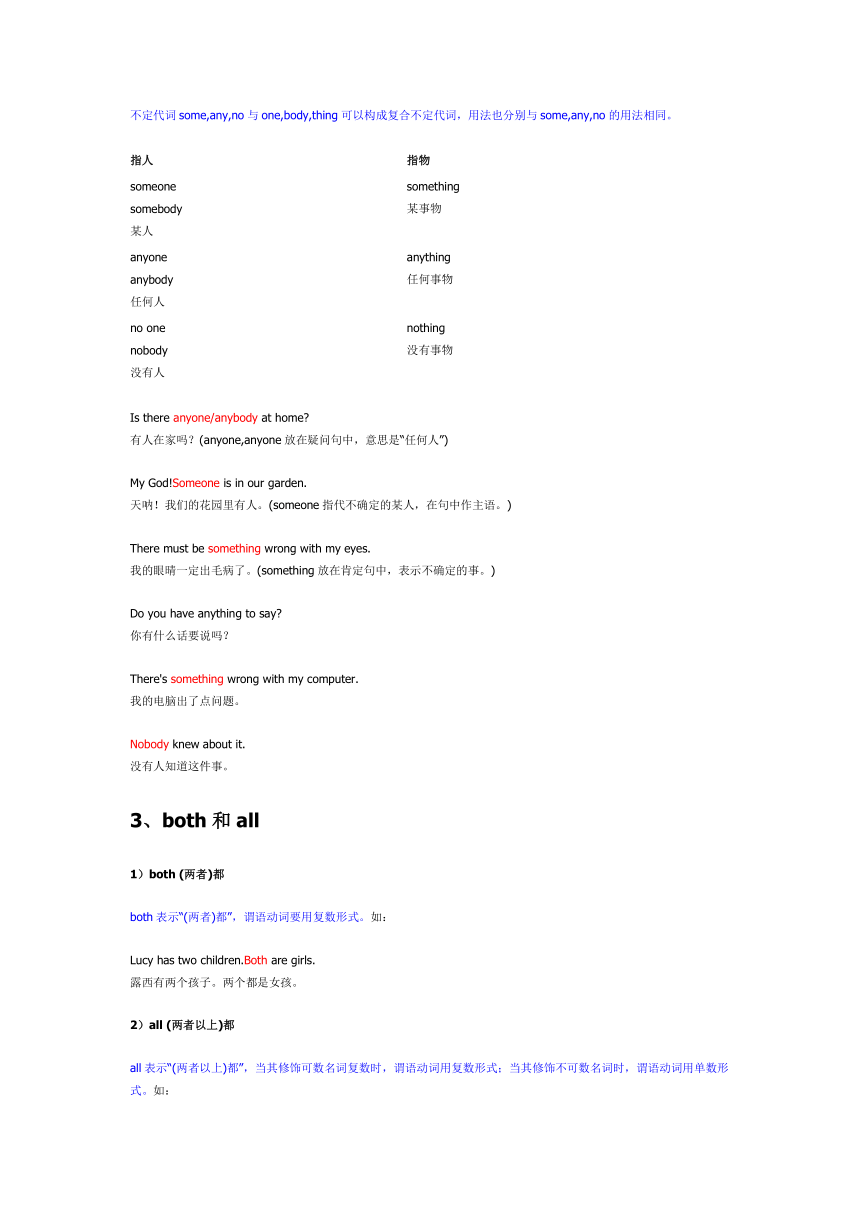2022年人教版九年级中考语法-不定代词2
文档属性
| 名称 | 2022年人教版九年级中考语法-不定代词2 |  | |
| 格式 | doc | ||
| 文件大小 | 40.5KB | ||
| 资源类型 | 教案 | ||
| 版本资源 | 通用版 | ||
| 科目 | 英语 | ||
| 更新时间 | 2022-04-15 15:49:53 | ||
图片预览


文档简介
2022年人教版九年级中考英语语法
不定代词
不定代词(Indefinite Pronouns)指的是不确定的、非特指的代词。不定代词包括some,any,no,both,all,either,neither等和由some,any,no与one,body,thing构成的复合不定代词,如:someone,anybody,nothing等。
1、some,any和no
1) some 一些
some通常用在肯定句中。也可以用在Would you like some.... 疑问句中,表示希望得到肯定回答。some可以作主语、宾语和定语。
I bought some tickets.
我买了几张票。
Would you like some juice
你想来点儿果汁吗?
2)any 任何/任一
any用在肯定句中表示任何。用在否定句或疑问句中表示任一,可以做主语、宾语和定语。如:
Any child can sing this song.
任何小孩都会唱这首歌。
There aren't any eggs in the chicken coop.
鸡舍里没有一个鸡蛋。
3)no 没有
no用在肯定句中表示否定,相当于not any或not a。no通常只可以作定语。如:
I have no money.
我没有钱。
He has no children.
他没有孩子
2、some,any和no构成的复合不定代词
不定代词some,any,no与one,body,thing可以构成复合不定代词,用法也分别与some,any,no的用法相同。
指人 指物
someone
somebody
某人 something
某事物
anyone
anybody
任何人 anything
任何事物
no one
nobody
没有人 nothing
没有事物
Is there anyone/anybody at home
有人在家吗?(anyone,anyone放在疑问句中,意思是“任何人”)
My God!Someone is in our garden.
天呐!我们的花园里有人。(someone指代不确定的某人,在句中作主语。)
There must be something wrong with my eyes.
我的眼晴一定出毛病了。(something放在肯定句中,表示不确定的事。)
Do you have anything to say
你有什么话要说吗?
There's something wrong with my computer.
我的电脑出了点问题。
Nobody knew about it.
没有人知道这件事。
3、both和all
1)both (两者)都
both表示“(两者)都”,谓语动词要用复数形式。如:
Lucy has two children.Both are girls.
露西有两个孩子。两个都是女孩。
2)all (两者以上)都
all表示“(两者以上)都”,当其修饰可数名词复数时,谓语动词用复数形式;当其修饰不可数名词时,谓语动词用单数形式。如:
Susan will invite all of her friends to her birthday party.
苏珊邀请她所有的朋友参加她的生日派对。
All countries have a national flag.
所有的国家都有国旗。
4、either和neither
1)either (两者中)任何一个
either表示“(两者中)任何一个”,谓语动词要用单数形式。如:
Dudu must be hiding behind either door.
嘟嘟一定藏在哪扇门后。
2)neither 两者都不
neither表示“两者都不”,谓语动词要用单数形式。如:
Neither glass is broken.
两个玻璃杯都没碎。
either,neither,both记忆,either表示两者中任意一个;neither表示两者中没有一个,全否定;both表示两者都,全肯定。
5、each和every
1)each 各自
each额头于两者或两者以上,含有“各自”的意味,指整体中的个别人或事物,谓语动词要用单数形式。如:
Each of you may try twice.
你们每个人都可以尝试两次。
2)every 全部
every用于三者或三者以上,含有“全部”的意味,谓语动词也要用单数形式。
Every girl has a doll.
每个女孩都有一个洋娃娃。
6、many,much,(a )few,(a )little
1) many和much 许多
many和much这两个词都表示“许多”,但many后接可数名词复数,much后接不可数名词。如:
How many birds are there in the nest
鸟巢里有几只小鸟?
I don't have much money on me now.
现在我身上没带那么多钱。
2) a few和a little 一些,少许
a few和a little都含有肯定含义,表法“一些、少许”,但a few修饰可数名词复数,a little后接不可数名词。如:
Charlie ate many pies and drank a little water.
查理吃了很多派,喝了一点儿水。
I made a few phone calls.
我打了几个电话。
3) few和little 几乎没有
few和little都含有否定含义,表示“几乎没有”,但few修饰可数名词复数,little后接不可数名词。如:
I have few friends in the strange city.But I am not lonely.
我在这个陌生的城市里几首没有朋友,但我并不孤单。
I had little money and little free time.
我没什么钱,也没多少空闲时间。
不定代词
不定代词(Indefinite Pronouns)指的是不确定的、非特指的代词。不定代词包括some,any,no,both,all,either,neither等和由some,any,no与one,body,thing构成的复合不定代词,如:someone,anybody,nothing等。
1、some,any和no
1) some 一些
some通常用在肯定句中。也可以用在Would you like some.... 疑问句中,表示希望得到肯定回答。some可以作主语、宾语和定语。
I bought some tickets.
我买了几张票。
Would you like some juice
你想来点儿果汁吗?
2)any 任何/任一
any用在肯定句中表示任何。用在否定句或疑问句中表示任一,可以做主语、宾语和定语。如:
Any child can sing this song.
任何小孩都会唱这首歌。
There aren't any eggs in the chicken coop.
鸡舍里没有一个鸡蛋。
3)no 没有
no用在肯定句中表示否定,相当于not any或not a。no通常只可以作定语。如:
I have no money.
我没有钱。
He has no children.
他没有孩子
2、some,any和no构成的复合不定代词
不定代词some,any,no与one,body,thing可以构成复合不定代词,用法也分别与some,any,no的用法相同。
指人 指物
someone
somebody
某人 something
某事物
anyone
anybody
任何人 anything
任何事物
no one
nobody
没有人 nothing
没有事物
Is there anyone/anybody at home
有人在家吗?(anyone,anyone放在疑问句中,意思是“任何人”)
My God!Someone is in our garden.
天呐!我们的花园里有人。(someone指代不确定的某人,在句中作主语。)
There must be something wrong with my eyes.
我的眼晴一定出毛病了。(something放在肯定句中,表示不确定的事。)
Do you have anything to say
你有什么话要说吗?
There's something wrong with my computer.
我的电脑出了点问题。
Nobody knew about it.
没有人知道这件事。
3、both和all
1)both (两者)都
both表示“(两者)都”,谓语动词要用复数形式。如:
Lucy has two children.Both are girls.
露西有两个孩子。两个都是女孩。
2)all (两者以上)都
all表示“(两者以上)都”,当其修饰可数名词复数时,谓语动词用复数形式;当其修饰不可数名词时,谓语动词用单数形式。如:
Susan will invite all of her friends to her birthday party.
苏珊邀请她所有的朋友参加她的生日派对。
All countries have a national flag.
所有的国家都有国旗。
4、either和neither
1)either (两者中)任何一个
either表示“(两者中)任何一个”,谓语动词要用单数形式。如:
Dudu must be hiding behind either door.
嘟嘟一定藏在哪扇门后。
2)neither 两者都不
neither表示“两者都不”,谓语动词要用单数形式。如:
Neither glass is broken.
两个玻璃杯都没碎。
either,neither,both记忆,either表示两者中任意一个;neither表示两者中没有一个,全否定;both表示两者都,全肯定。
5、each和every
1)each 各自
each额头于两者或两者以上,含有“各自”的意味,指整体中的个别人或事物,谓语动词要用单数形式。如:
Each of you may try twice.
你们每个人都可以尝试两次。
2)every 全部
every用于三者或三者以上,含有“全部”的意味,谓语动词也要用单数形式。
Every girl has a doll.
每个女孩都有一个洋娃娃。
6、many,much,(a )few,(a )little
1) many和much 许多
many和much这两个词都表示“许多”,但many后接可数名词复数,much后接不可数名词。如:
How many birds are there in the nest
鸟巢里有几只小鸟?
I don't have much money on me now.
现在我身上没带那么多钱。
2) a few和a little 一些,少许
a few和a little都含有肯定含义,表法“一些、少许”,但a few修饰可数名词复数,a little后接不可数名词。如:
Charlie ate many pies and drank a little water.
查理吃了很多派,喝了一点儿水。
I made a few phone calls.
我打了几个电话。
3) few和little 几乎没有
few和little都含有否定含义,表示“几乎没有”,但few修饰可数名词复数,little后接不可数名词。如:
I have few friends in the strange city.But I am not lonely.
我在这个陌生的城市里几首没有朋友,但我并不孤单。
I had little money and little free time.
我没什么钱,也没多少空闲时间。
同课章节目录
- 词法
- 名词
- 动词和动词短语
- 动词语态
- 动词时态
- 助动词和情态动词
- 非谓语动词
- 冠词
- 代词
- 数词和量词
- 形容词副词及其比较等级
- 介词和介词短语
- 连词和感叹词
- 构词法
- 相似、相近词比较
- 句法
- 陈述句
- 一般疑问句和否定疑问句
- 特殊疑问句及选择疑问句
- 反意疑问句
- 存在句(There be句型)
- 宾语从句
- 定语从句
- 状语从句
- 主谓一致问题
- 简单句
- 并列句
- 复合句
- 主谓一致
- 主、表语从句
- 名词性从句
- 直接引语和间接引语
- 虚拟语气
- 感叹句
- 强调句
- 倒装句
- 祈使句
- 句子的成分
- 句子的分类
- 题型专区
- 单项选择部分
- 易错题
- 完形填空
- 阅读理解
- 词汇练习
- 听说训练
- 句型转换
- 补全对话
- 短文改错
- 翻译
- 书面表达
- 任务型阅读
- 语法填空
- 其他资料
